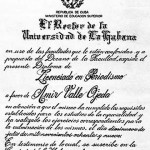“Here’s the bottom line: I, a traitor, came back, and I enjoy what you, an ideological soldier, a philosophical and patriotic fanatic, do not have nor will have in many years. I am a lucky traitor, don’t you think?”
Manuscripts of the dead
Cienfuegos is a beautiful city that he will never forget. During the complete euphoria over the country’s Plan of Action (1989), he was assigned as a correspondent to cover two of the nation’s principal objectives: the construction of the nuclear power plant at Juraguá, and the petroleum refinery. It was a shock when he discovered journalistically (and innocently revealed the proof) that neither of the two constructions would start operating with the triumphant promptness that the government was proclaiming. The nuclear plant is today a dead skeleton, tortured by the sea, there at the southern tip of the island. The refinery had better luck: it recuperated, with great difficulty, in January 2008, thanks to the petroleum sent by Venezuela.
He completed three years of public service in the so-called Pearl of the South. Radio was his medium of expression. He learned about journalism, as they say in Cuba, “by giving up work to work.” He learned first-hand the rigid standards of Cuban reporting. But he is still grateful for those years in radio: “Today I owe to them the habit of sitting down and writing every day”.
In spite of everything, he was awarded the Cuban National Radio Prize for Non-Dramatized Historical Reporting in 1991, for his coverage of the Israeli-Palestinian conflict.
